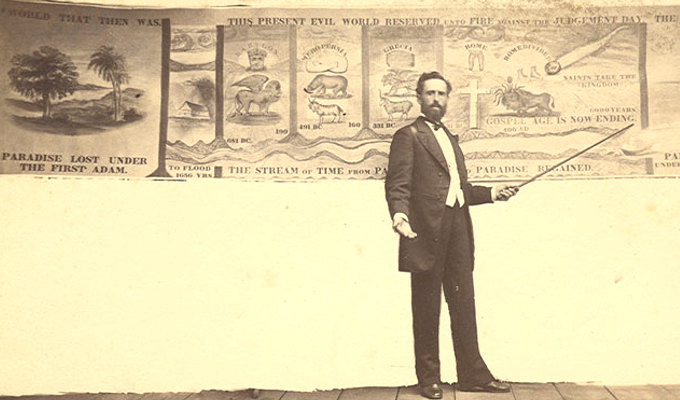
The Doctrine of Balaam
Balaam was once a good man and a prophet of God; but he had apostatized, and had given himself up to covetousness; yet he still professed to be a servant of the Most High.
He was not ignorant of God’s work in behalf of Israel; and when the messengers announced their errand, he well knew that it was his duty to refuse the rewards of Balak and to dismiss the ambassadors. But he ventured to dally with temptation, and urged the messengers to tarry with him that night, declaring that he could give no decided answer till he had asked counsel of the Lord. Balaam knew that his curse could not harm Israel.
God was on their side, and so long as they were true to Him no adverse power of earth or hell could prevail against them. But his pride was flattered by the words of the ambassadors, “He whom thou blessest is blessed, and he whom thou cursest is cursed.” The bribe of costly gifts and prospective exaltation excited his covetousness.
He greedily accepted the offered treasures, and then, while professing strict obedience to the will of God, he tried to comply with the desires of Balak. {PP 439.2}
In the night season the angel of God came to Balaam with the message, “Thou shalt not go with them; thou shalt not curse the people: for they are blessed.” In the morning Balaam reluctantly dismissed the messengers, but he did not tell them what the Lord had said. Angry that his visions of gain and honor had been suddenly dispelled, he petulantly exclaimed, “Get you into your land: for the Lord refuseth to give me leave to go with you.” {PP 439.4}
Balaam “loved the wages of unrighteousness.” 2 Peter 2:15. The sin of covetousness, which God declares to be idolatry, had made him a timeserver, and through this one fault Satan gained entire control of him. It was this that caused his ruin. The tempter is ever presenting worldly gain and honor to entice men from the service of God. He tells them it is their overconscientiousness that keeps them from prosperity. Thus many are induced to venture out of the path of strict integrity. One wrong step makes the next easier, and they become more and more presumptuous. They will do and dare most terrible things when once they have given themselves to the control of avarice and a desire for power.
Many flatter themselves that they can depart from strict integrity for a time, for the sake of some worldly advantage, and that having gained their object, they can change their course when they please. Such are entangling themselves in the snare of Satan, and it is seldom that they escape. {PP 439.5}
Disappointed in his hopes of wealth and promotion, in disfavor with the king, and conscious that he had incurred the displeasure of God, Balaam returned from his self-chosen mission. After he had reached his home the controlling power of the Spirit of God left him, and his covetousness, which had been merely held in check, prevailed. He was ready to resort to any means to gain the reward promised by Balak. Balaam knew that the prosperity of Israel depended upon their obedience to God, and that there was no way to cause their overthrow but by seducing them into sin. He now decided to secure Balak’s favor by advising the Moabites of the course to be pursued to bring a curse upon Israel. {PP 451.3}
He immediately returned to the land of Moab and laid his plans before the king. The Moabites themselves were convinced that so long as Israel remained true to God, He would be their shield. The plan proposed by Balaam was to separate them from God by enticing them into idolatry. If they could be led to engage in the licentious worship of Baal and Ashtaroth, their omnipotent Protector would become their enemy, and they would soon fall a prey to the fierce, warlike nations around them. This plan was readily accepted by the king, and Balaam himself remained to assist in carrying it into effect. {PP 451.4}
Balaam witnessed the success of his diabolical scheme. He saw the curse of God visited upon His people, and thousands falling under His judgments; but the divine justice that punished sin in Israel did not permit the tempters to escape. In the war of Israel against the Midianites, Balaam was slain. He had felt a presentiment that his own end was near when he exclaimed, “Let me die the death of the righteous, and let my last end be like his!” But he had not chosen to live the life of the righteous, and his destiny was fixed with the enemies of God. {PP 451.5}
The fate of Balaam was similar to that of Judas, and their characters bear a marked resemblance to each other. Both these men tried to unite the service of God and mammon, and met with signal failure. Balaam acknowledged the true God, and professed to serve Him; Judas believed in Jesus as the Messiah, and united with His followers. But Balaam hoped to make the service of Jehovah the steppingstone to the acquirement of riches and worldly honor; and failing in this he stumbled and fell and was broken. Judas expected by his connection with Christ to secure wealth and promotion in that worldly kingdom which, as he believed, the Messiah was about to set up. The failure of his hopes drove him to apostasy and ruin. Both Balaam and Judas had received great light and enjoyed special privileges, but a single cherished sin poisoned the entire character and caused their destruction. {PP 452.1}
It is a perilous thing to allow an unchristian trait to live in the heart. One cherished sin will, little by little, debase the character, bringing all its nobler powers into subjection to the evil desire. The removal of one safeguard from the conscience, the indulgence of one evil habit, one neglect of the high claims of duty, breaks down the defenses of the soul and opens the way for Satan to come in and lead us astray. The only safe course is to let our prayers go forth daily from a sincere heart, as did David, “Hold up my goings in Thy paths, that my footsteps slip not.” Psalm 17:5. {PP 452.2}







![12.01.2021 – ITALY GATE – SHM [F1]](https://savinghealthministries.com/wp-content/uploads/12.01.2021-ITALY-GATE-SHM-F1-320x180.jpg)
